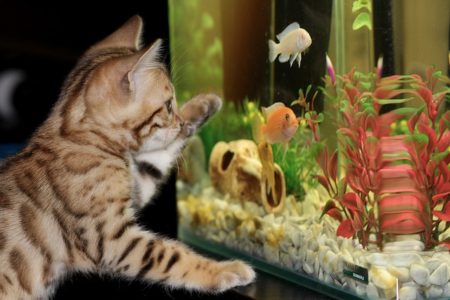
Image credit: Counselling
Pets save us from loneliness and stress. And they are also able to teach us important lessons of life – of course, provided that we observe them carefully and love them as they are.
“I want a kitten!”
So says the kid, and we’re planting a kitten. Or a hamster. Or a puppy. Our main motive is this: the child must grow up kind and responsible, and his own pet will become his helper in this business. Caring for the development of children’s responsibility and independence, parents try to put care of the newly acquired animal on the shoulders of the child. And they achieve the opposite result: it is really difficult for them to cope alone with regular and not always pleasant new responsibilities. He feels confused and comes to the conclusion that worrying about who is weaker and less than you is burdensome. So, if we want our children to be responsible for those who are tamed, they need to teach it. You can start by taking care of a new friend together.
Love to the animal or love to yourself?
Today, we take care not at all like before: hairdressers, hotels and even a clubhouse for dogs and cats, appearing abundantly around them, make their life look like ours. We are happy to play this game without thinking about whether it’s all necessary for the animal itself? Do they benefit from such a human being? “When the owner feeds the dog or cat with what he is eating himself, he dresses himself in clothes and stays in bed, he as if replaces his unsuccessful relationship with another person,” says zoopsiholog Elena Fedorovich. “By forcing our dog or parrot to live almost human lives, we care not so much about his true desires, but about our own needs, which for some reason we can not satisfy,” continues Irina Novozhilova. “We are trying, for example, to fill the lack of tenderness or lack of self-confidence.”
“Unlimitedly devoted dog”, “sensitive, delicate cat” – we use a lot of language cliches when we talk about our own pets. “The discussion of the smallest details of their life, character and habits often masks our narcissistic need to be in the spotlight,” says Anna Scavitina, a psychoanalyst, “and is often found among people who find it hard to talk about themselves.”
Useful addition
By attributing to our favorites an amazing gift to heal our mental illnesses, we tend to exaggerate the psychotherapeutic ability of domestic animals. “Communication with a dog or a cat, of course, helps us cope with situational stress and tension, but does not solve the deep psychological problems,” explains Elena Fedorovich. – By watching animals, we learn to understand without words, develop our intuition and observation – I think it is this, in the first place, that there is a positive effect of communicating with them. ”
The phenomenon of “pet” evolved together with the desire of man to conquer nature. “From ancient times, people were dual to the animal: on the one hand, many of them are a constant object of hunting; on the other hand, human society is interested in replenishing their population, and, consequently, it is necessary to establish relations with them, and to revenge their guilt in front of them. , – says Anthropologist Artem Kozmin. “That is why today, as in ancient times, good hunters” talk “with those who should become their prey; In many tribes living in hunting, the bones of the dead and eaten beast are dug with honors. Perhaps our love for a pet partly continues the tradition. Surrounding the care and attention of cats, dogs, horses, we unconsciously bury the mass killing of cows, pigs and sheep. ” In other words, attachment to a pet allows a person to take the blame for the extermination of animals whose meat we eat daily in food, in fur and skin of which we dress.
DOGS

Image credit: congerdesign
Main features: communicative, devotional. The dog is ready to perform a role in the family. For example, a watchman or nanny.
The character of the host. Different reasons lead to the fact that people start a dog. Those who have decided on this step can be open, emotional or restrained people, but all of them are united by the increased need for warm, emotional-filled relationships. The owners of dogs especially value their ability to fidelity in their pets, not depending on any external circumstances.
What do dogs teach us? To orient themselves in a situation before tying relationships. The dog is an attentive observer who is surprisingly subtle feeling of the very different emotions and intentions of people. Having got into a new team, the dog needs some time to understand how the roles are distributed here, who is the leader, who is the breadwinner, who will play and walk with her. And only by orienting itself in the system of relations between people, the dog establishes his special relationship with each of the members of the collective separately. Its tact and the ability to connect with people, depending on their individual characteristics and preferences, is really worth learning.
CATS

Image credit: AllNikArt
Main features: independence and ability to observe the distance. A cat is unobtrusive in communication, she carefully doses signs of her love and she decides what to do.
The character of the host. A distracting stereotype attributing the lovers of cats to the traits of a single dreamer is not so far from the truth. In order to live with her, the master must respect her territory and the rhythm of life, and this suggests in him the tendency to think more than to action.
What do cats teach us? Live and give life to others. A cat knows what she wants, and unmistakably chooses what she really suits best. That is why many are inclined to consider it cold and selfish. But this is not true: the cat is a very sensitive creature, and its attachment to the owner, albeit not as obvious as a dog, makes it a faithful friend, ready to support and calm down – mainly through gentle touches. In this way, the cat gives us a wonderful lesson on how to balance the interests and the needs of others.
RATS

Image credit: Kapa65
Main trait: curiosity. In search of food and new experiences, this little creature is ready to explore the most remote corners of a human dwelling. The rats are easy to train, distinguish people by smell and unmistakably recognize the host among them.
The character of the host. The rats produce original species: as a rule, they like that these rodents do not require special care, and because of curiosity they are perfectly adapted to any situation. These qualities make the rat an excellent companion: it can be constantly carried with you, take on trips and demonstrate to others. In addition, rats are often chosen by people who do not have tactile sensations in their everyday life: their miniature pets do not just love to crawl on the hands, shoulders and the head of the host, but they also get enormous pleasure from this.
What do rats teach us? Acceptance of a creature in spite of the resistance of others: the ancient stereotypes attributing a lot of negative qualities to the rats are still strong enough, and the person who risked the creation of this animal will have to affirm their feelings towards him, regardless of the condemnation and misunderstanding of others. In addition, in spite of the well-known unpretentiousness, the rat still needs to adhere to certain norms (so, in the cell it should always be clean), which accustoms man to responsibly and respectful of respect for other people’s interests – however, in a rather soft and uncomplicated form.
FISHES

Image credit: Irina_kukuts
Main feature: Zen style behavior. Closed and impassable in their hermetic aquarium, they show us the peace of mind that we should learn.
The character of the host. Hardly in this case it is appropriate to talk about the owner in the traditional sense of the word. Even a zealous aquarist, most likely, will not come to mind sharing experiences with his vealworms, who are unlikely to be able to distinguish his hand, giving them daily food, from any other. The one who starts the fish is rather contemplative and restrained. Fish that do not require emotion or active participation in their lives from their owner will be ideal companions for such a person. In addition, fish are often made by people who are accustomed to control everything.
What do aquarium fishes teach us? Relax. It has long been noted that aquarium fishes are a great object for meditation. In the harsh conditions of a large city, many of us simply have lost the ability to rest with the soul and body, while the aquarium helps us to restore this invaluable skill. In addition, it allows us to combine admiration for the unpredictability and beauty of wildlife with a natural desire for peace, comfort and safety: the aquarium is a real ocean in miniature, but there is never a tsunami or storms on this ocean.
